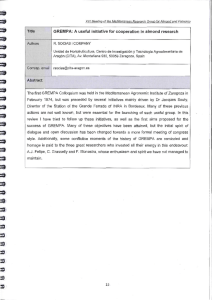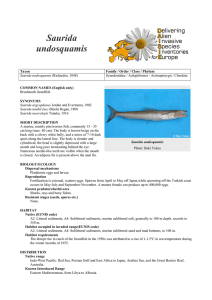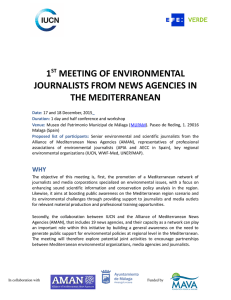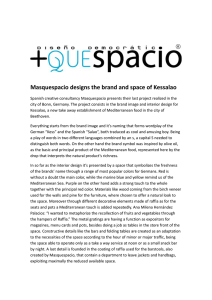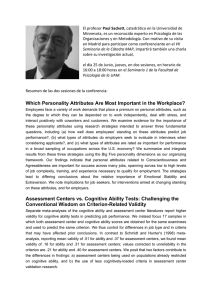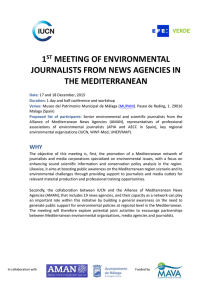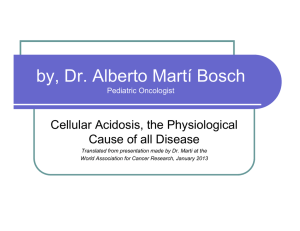Mediterranean Diet and Age-Related Cognitive
Anuncio
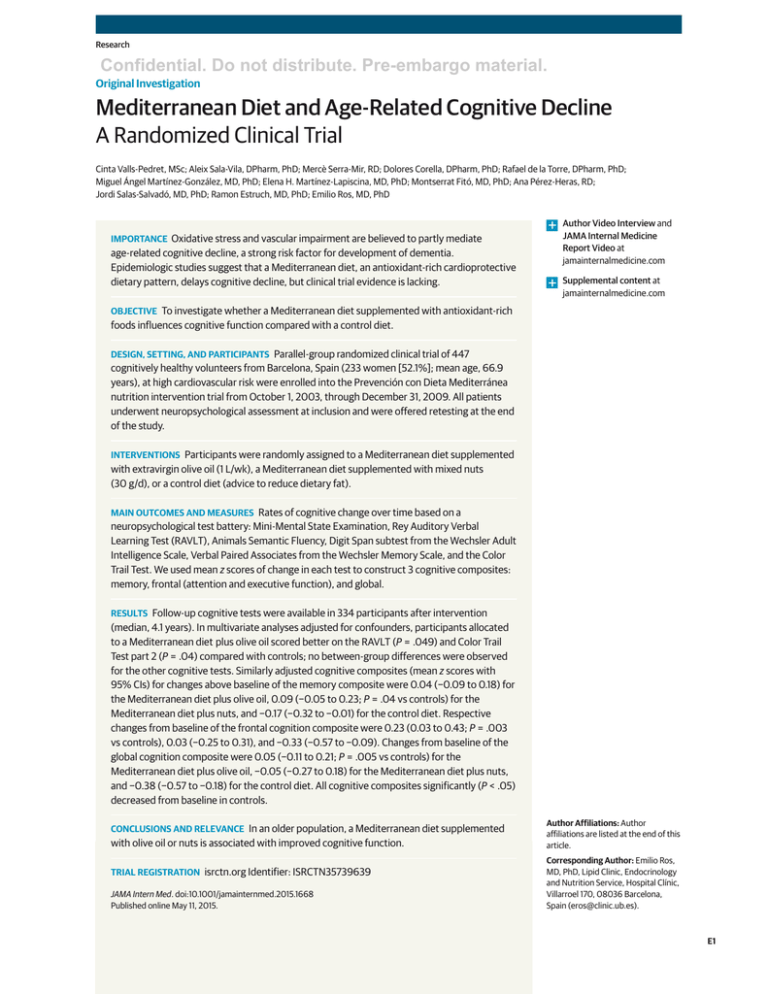
Research Confidential. Do not distribute. Pre-embargo material. Original Investigation Mediterranean Diet and Age-Related Cognitive Decline A Randomized Clinical Trial Cinta Valls-Pedret, MSc; Aleix Sala-Vila, DPharm, PhD; Mercè Serra-Mir, RD; Dolores Corella, DPharm, PhD; Rafael de la Torre, DPharm, PhD; Miguel Ángel Martínez-González, MD, PhD; Elena H. Martínez-Lapiscina, MD, PhD; Montserrat Fitó, MD, PhD; Ana Pérez-Heras, RD; Jordi Salas-Salvadó, MD, PhD; Ramon Estruch, MD, PhD; Emilio Ros, MD, PhD IMPORTANCE Oxidative stress and vascular impairment are believed to partly mediate age-related cognitive decline, a strong risk factor for development of dementia. Epidemiologic studies suggest that a Mediterranean diet, an antioxidant-rich cardioprotective dietary pattern, delays cognitive decline, but clinical trial evidence is lacking. Author Video Interview and JAMA Internal Medicine Report Video at jamainternalmedicine.com Supplemental content at jamainternalmedicine.com OBJECTIVE To investigate whether a Mediterranean diet supplemented with antioxidant-rich foods influences cognitive function compared with a control diet. DESIGN, SETTING, AND PARTICIPANTS Parallel-group randomized clinical trial of 447 cognitively healthy volunteers from Barcelona, Spain (233 women [52.1%]; mean age, 66.9 years), at high cardiovascular risk were enrolled into the Prevención con Dieta Mediterránea nutrition intervention trial from October 1, 2003, through December 31, 2009. All patients underwent neuropsychological assessment at inclusion and were offered retesting at the end of the study. INTERVENTIONS Participants were randomly assigned to a Mediterranean diet supplemented with extravirgin olive oil (1 L/wk), a Mediterranean diet supplemented with mixed nuts (30 g/d), or a control diet (advice to reduce dietary fat). MAIN OUTCOMES AND MEASURES Rates of cognitive change over time based on a neuropsychological test battery: Mini-Mental State Examination, Rey Auditory Verbal Learning Test (RAVLT), Animals Semantic Fluency, Digit Span subtest from the Wechsler Adult Intelligence Scale, Verbal Paired Associates from the Wechsler Memory Scale, and the Color Trail Test. We used mean z scores of change in each test to construct 3 cognitive composites: memory, frontal (attention and executive function), and global. RESULTS Follow-up cognitive tests were available in 334 participants after intervention (median, 4.1 years). In multivariate analyses adjusted for confounders, participants allocated to a Mediterranean diet plus olive oil scored better on the RAVLT (P = .049) and Color Trail Test part 2 (P = .04) compared with controls; no between-group differences were observed for the other cognitive tests. Similarly adjusted cognitive composites (mean z scores with 95% CIs) for changes above baseline of the memory composite were 0.04 (−0.09 to 0.18) for the Mediterranean diet plus olive oil, 0.09 (−0.05 to 0.23; P = .04 vs controls) for the Mediterranean diet plus nuts, and −0.17 (−0.32 to −0.01) for the control diet. Respective changes from baseline of the frontal cognition composite were 0.23 (0.03 to 0.43; P = .003 vs controls), 0.03 (−0.25 to 0.31), and −0.33 (−0.57 to −0.09). Changes from baseline of the global cognition composite were 0.05 (−0.11 to 0.21; P = .005 vs controls) for the Mediterranean diet plus olive oil, −0.05 (−0.27 to 0.18) for the Mediterranean diet plus nuts, and −0.38 (−0.57 to −0.18) for the control diet. All cognitive composites significantly (P < .05) decreased from baseline in controls. CONCLUSIONS AND RELEVANCE In an older population, a Mediterranean diet supplemented with olive oil or nuts is associated with improved cognitive function. TRIAL REGISTRATION isrctn.org Identifier: ISRCTN35739639 JAMA Intern Med. doi:10.1001/jamainternmed.2015.1668 Published online May 11, 2015. Author Affiliations: Author affiliations are listed at the end of this article. Corresponding Author: Emilio Ros, MD, PhD, Lipid Clinic, Endocrinology and Nutrition Service, Hospital Clínic, Villarroel 170, 08036 Barcelona, Spain ([email protected]). (Reprinted) E1 Research Original Investigation Mediterranean Diet and Cognitive Decline Confidential. Do not distribute. Pre-embargo material. I ncreased lifespan in developed countries has resulted in a greatly increased frequency of age-related diseases, including Alzheimer disease,1 the most common type of dementia.2 The economic and social burden of caring for persons with dementia is increasing, and to date there are no effective pharmacologic agents to prevent or treat the disease3 or even its precursor stages.4 The view is emerging that to achieve a benefit an intervention would likely need to be started in the preclinical stage, a situation that applies to a substantial proportion of the elderly population worldwide.5 Hence, identifying simple and effective interventions to prevent dementia or delay its onset is a major public health priority. Emerging evidence suggests an association between dietary habits and cognitive performance.6,7 Oxidative stress has long been considered to play a major role in cognitive decline and neurodegenerative disorders.8 Thus, it is plausible that, by counteracting oxidative stress, antioxidant-rich foods might afford protection from neurodegenerative diseases. The Mediterranean diet is a plant-based, antioxidant-rich dietary pattern reputed for its many health benefits.9 As previously reviewed,10-12 data from large observational studies suggest that increasing adherence to Mediterranean-type diets relates to better cognitive function and a reduced risk of dementia. The observational studies analyzed, however, have many limitations: dietary assessment performed usually only once before outcome ascertainment, heterogeneity of Mediterranean diet scores used to define dietary conformity, diversity of neuropsychological instruments used to assess cognitive function, and residual confounding because individuals with high Mediterranean diet scores tend to have healthier lifestyles. All these reasons highlight the need for randomized clinical trials.13 The Prevención con Dieta Mediterránea (PREDIMED) randomized clinical trial reported that, compared with a control diet that consists of advice to reduce dietary fat, a Mediterranean diet supplemented with either extravirgin olive oil or mixed nuts for nearly 5 years reduced the incidence of cardiovascular diseases by 30% in older individuals at high risk.14 The Mediterranean diet used in the PREDIMED trial in general and the 2 supplemental foods in particular are rich in bioactive phytochemicals with antioxidant and anti-inflammatory properties.15,16 Thus, it is plausible that, together with the overall dietary pattern, olive oil and nuts might improve or at least delay age-related cognitive decline. In fact, another PREDIMED substudy in which participants underwent neuropsychological testing once at trial’s end reported improved cognition in the 2 Mediterranean diet arms, but the lack of baseline evaluation precluded assessment of changes over time.17,18 To address this issue, we evaluated cognitive changes with rep e ate d m e a s u re m e nt s u s i ng a b atte r y o f s t a n d a rd neuropsychological tests in a PREDIMED subcohort of cognitively healthy individuals. Methods E2 scribed in detail elsewhere.19 The text of the study protocol can be found in the trial protocol in Supplement 1. For this analysis, we asked 578 individuals consecutively recruited in the Barcelona-North PREDIMED center from October 1, 2003, through December 31, 2009, to undergo neuropsychological tests to assess cognition at 2 time points, as previously described.20 Study participants were men aged 55 to 80 years and women aged 60 to 80 years at high cardiovascular risk but no cardiovascular disease at enrollment. Criteria for eligibility were the presence of either type 2 diabetes mellitus or at least 3 of 5 cardiovascular risk factors: smoking, hypertension, dyslipidemia, overweight or obesity, and family history of early-onset coronary heart disease. Exclusion criteria were prior cardiovascular disease, any severe chronic illness, substance abuse, illiteracy, and history of allergy or intolerance to the supplemental foods olive oil or nuts. Exclusion criteria specific for this substudy were difficulty in expression or comprehension of the Spanish language, depression (defined as a score >13 on the Hamilton Depression Rating Scale), and mild cognitive impairment (defined according to the Petersen diagnostic criteria, which include memory symptoms, scores <1.5 SDs of the mean of a reference population on an episodic memory test, preserved activities of daily living, and absence of dementia).21 We obtained baseline and yearly data on medical history, medication use, lifestyle, and adiposity. Fasting venous blood and morning urine samples were obtained at baseline, 1 year, 3 years, 5 years, and the trial’s termination, whichever came first. The study protocol was conducted according to the guidelines laid down in the Declaration of Helsinki, and all procedures were approved by the Comité Ético de Investigación Clínica del Hospital Clínic de Barcelona (Clinical Research Ethics Committee of Hospital Clínic of Barcelona). Written informed consent was obtained from all participants. Eligible candidates were randomly assigned to 1 of 3 intervention groups: a Mediterranean diet supplemented with extravirgin olive oil, a Mediterranean diet supplemented with mixed nuts, or a control diet (advice to reduce all dietary fat). Randomization was performed centrally by means of a computer-generated random-number sequence in blocks of 50 participants balanced by sex and age (<70 and ≥70 years).19 Assessment of Risk Factors Participants were considered to have diabetes, hyperlipidemia, or hypertension if they had a previous diagnosis of these conditions or were treated with antidiabetic, cholesterollowering, or antihypertensive agents, respectively. Anthropometric measurements were performed by standard methods, as previously described.19 Smoking status was categorized into never, current, or past smoking according to self-reports. Physical activity was assessed with the validated Spanish version of the Minnesota Leisure Time Physical Activity Questionnaire and expressed in minutes at a given metabolic equivalent per day.22 Participants Dietary Assessment and Nutritional Interventions This clinical trial was conducted in a subcohort of the PREDIMED trial (http://www.predimed.es). The protocol has been de- Dietary data were collected during a face-to-face interview with a trained dietitian using a validated 137-item food-frequency JAMA Internal Medicine Published online May 11, 2015 (Reprinted) jamainternalmedicine.com Mediterranean Diet and Cognitive Decline Original Investigation Research Confidential. Do not distribute. Pre-embargo material. Figure 1. Flow Diagram of the Study 578 Assessed for eligibility 131 Excluded 58 Not meeting inclusive criteria 10 MCI, dementia, other neurologic disease 21 Depression, other psychiatric disease 27 Other causes 33 Refused to participate 40 Missing data 447 Randomized 155 Assigned to Mediterranean diet plus extravirgin olive oil Underwent baseline cognitive tests 147 Assigned to Mediterranean diet plus nuts Underwent baseline cognitive tests 145 Assigned to control diet Underwent baseline cognitive tests 25 Lost to follow-up 4 Withdrawal 11 Refused to undergo retesting 4 Lost contact 4 Illness 2 Death 34 Lost to follow-up 9 Withdrawal 20 Refused to undergo retesting 1 Lost contact 3 Illness 1 Death 48 Lost to follow-up 24 Withdrawal 17 Refused to undergo retesting 6 Illness 1 Death Median follow-up, 4.1 years Median follow-up, 3.6 years Median follow-up, 4.2 years 130 Underwent follow-up cognitive tests 3 Excluded from analyses because of depression 127 Included in analyses 113 Underwent follow-up cognitive tests 1 Excluded from analyses because of depression 112 Included in analyses 97 Underwent follow-up cognitive tests 2 Excluded from analyses because of depression 95 Included in analyses questionnaire.23 Nutrient intakes were computed using Spanish food composition tables and adjusted for energy intake. Candidates were randomly assigned to 1 of 3 interventions: Mediterranean diet plus olive oil, Mediterranean diet plus nuts, or control diet. Quarterly sessions were scheduled for the 2 Mediterranean diet groups; in them, they were educated on how to follow the Mediterranean diet and received supplemental foods at no cost. Olive oil (1 L/wk) was provided to one group and 30 g/d of mixed nuts (15 g of walnuts, 7.5 g of hazelnuts, and 7.5 g of almonds) to the other group. During the first 3 years of the trial, participants in the control diet group were scheduled for yearly visits in which they were given a leaflet explaining the low-fat diet. The realization that the more infrequent visits for this group might be a limitation of the trial prompted a protocol amendment in October 2006. Thereafter, participants allocated to the control diet received personalized advice and group sessions with the same frequency and intensity as those in the Mediterranean diet groups. In them, participants were educated on how to follow a low-fat diet and received small nonfood gifts. In each session, a validated 14item screener of adherence to the Mediterranean diet was used to track diet changes.24 Neither energy restriction nor increased physical activity was advised for any treatment arm. Evaluation of Cognitive Function An experienced neuropsychologist (C.V.-P.) who was masked to the participants’ diet and cardiovascular risk factors conjamainternalmedicine.com MCI indicates mild cognitive impairment. ducted the cognitive examinations. Neuropsychological tests were performed at baseline and repeated at the date closest to the study’s termination that was most convenient for participants. Thus, follow-up time was not the same for all study participants. The instruments used were the Mini-Mental State Examination to assess global cognitive function, the Rey Auditory Verbal Learning Test (RAVLT) to rate immediate (sum of words recalled on the 5 learning trials) and delayed episodic verbal memory, and the verbal paired associates test, a subtest of Wechsler Memory Scale, to evaluate episodic memory performance. While recruitment was ongoing, we added tests to assess changes in language and frontal functions as well. To this end, we included the animal fluency test to evaluate semantic fluency, the Digit Span subtest of the Wechsler Adult Intelligence Scale to assess immediate memory (forward digits) and working memory (backward digits), and the Color Trail Test (parts 1 and 2) to measure attention, visuomotor speed, and cognitive flexibility. Participants’ raw test changes were standardized to z scores, and 3 composite scores of cognitive function were calculated for each participant. First, the memory composite included the mean standardized individual change scores of the RAVLT and Wechsler Memory Scale paired associates subtest. The second composite score related to frontal functions, including tests measuring attention, cognitive flexibility and working memory, and was constructed by averaging standardized change scores of the Wechsler Adult Intelligence Scale Digit Backward Test and Color Trail (Reprinted) JAMA Internal Medicine Published online May 11, 2015 E3 Research Original Investigation Mediterranean Diet and Cognitive Decline Confidential. Do not distribute. Pre-embargo material. Table 1. Baseline Characteristics of Participants by Study Groupa Characteristic Mediterranean Diet Plus Extravirgin Olive Oil (n = 127) Mediterranean Diet Plus Nuts (n = 112) P Valueb Men 60 (47.2) 58 (51.8) 46 (48.4) .77 Age, mean (SD), y 67.9 (5.4)c 66.7 (5.3) 65.5 (5.8) .005 Body mass index, mean (SD) 28.5 (3.3) 28.4 (3.2) 28.5 (3.3) .95 6.8 (3.0) 7.6 (3.3) 7.1 (2.8) .13 101 (79.5) 89 (79.5) 74 (77.9) .47 Family history of early-onset CHD 40 (31.5) 23 (20.5) 32 (33.7) .07 Ever smoker 54 (42.5) 47 (42.0) 44 (46.3) .79 Dyslipidemia 96 (75.6) 83 (74.1) 68 (71.6) .80 Educational level, mean (SD), y Married Total cholesterol, mean (SD), mg/dL 220.7 (32.1)c 217.1 (37.6) 209.4 (33.6) .051 LDL-C, mean (SD), mg/dL 136.4 (31.2) 137.0 (33.7) 129.3 (28.4) .15 54.7 (13.9) 51.6 (12.0) .01 128.7 (65.9) 146.1 (87.7) .34 HDL-C, mean (SD), mg/dL Triglycerides, mean (SD), mg/dL Ratio of total cholesterol to HDL-C 57.5 (16.5)c 134.4 (99.5) 4.1 (0.99) 4.1 (0.95) 4.2 (0.97) .54 Use of hypolipidemic drugs 67 (52.8) 53 (47.3) 47 (49.5) .70 Hypertension 98 (77.2) 77 (68.8) 73 (76.8) .26 Use of antihypertensive agents 86 (67.7) 71 (63.4) 63 (66.3) .78 Type 2 diabetes mellitus 70 (55.1) 66 (58.9) 48 (50.5) .48 Use of antidiabetic medication 34 (26.8) 41 (36.6) 36 (37.9) .20 Use of anticholinergic drugs 20 (15.7) 13 (11.6) 15 (15.8) .59 Physical activity, mean (SD), MET-min/d 541 (358) 554 (339) 516 (349) .73 24 (18.9) 14 (12.5) 14 (14.7) .38 2.1 (2.5) 2.2 (2.6) 2.4 (2.6) .68 APOE ε4 genotype Hamilton Depression Rating Scale score, mean (SD) Test (parts 1 and 2). Third, a global cognition composite was generated by computing the mean standardized changes of all neuropsychological tests, including the Mini-Mental State examination. These 3 composite scores were prespecified as the primary outcomes of the study. Incident cases of mild cognitive impairment were recorded as well. Laboratory Determinations To determine adherence to supplemental foods, we measured urinary hydroxytyrosol (the main phenolic compound in extravirgin olive oil) and plasma proportions of α-linolenic acid (a fatty acid characteristic of walnuts) at baseline and the closest time point to the second cognitive evaluation in a random subsample of participants, as described.14 The APOE ε4 genotype was determined with the method of Hixson and Vernier.25 Statistical Analyses Baseline imbalances in demographic variables and cardiovascular risk factors among treatment groups were assessed by analysis of variance (ANOVA) or χ2 tests, as appropriate. Differences between the participants who withdrew from and those who remained in the study were assessed by the t test or χ2 tests, as appropriate. Baseline and postintervention (the time point closest to the second cognitive evaluation) food and nutrient consumption and biomarkers of adherence were assessed by ANOVA. Between-group differences in baseline neuropsychological test scores were assessed by ANOVA and in addition by analysis of covariance (ANCOVA) with adjustment for sex, baseline age, years E4 Control Diet (n = 95) JAMA Internal Medicine Published online May 11, 2015 (Reprinted) Abbreviations: CHD, coronary heart disease; HDL-C, high-density lipoprotein cholesterol; LDL-C, low-density lipoprotein cholesterol; MET-min, minutes at a given metabolic equivalent level (units of energy expenditure in physical activity, 1 MET-min roughly equivalent to 1 Kcal). SI conversion factors: To convert cholesterol values to millimoles per liter, multiply by 0.0259; triglyceride levels to millimoles per liter, multiply by 0.0113. a Data are presented as number (percentage) of patients unless otherwise indicated. b P value for comparisons across groups with the Pearson χ2 test for categorical variables or 1-way analysis of variance for continuous variables. c Significantly different from control diet group (Bonferroni post hoc test). of education, APOE ε4 genotype, smoking, body mass index, energy intake, physical activity, diabetes, hyperlipidemia, the ratio of total cholesterol to high-density lipoprotein cholesterol, statin treatment, hypertension, and use of anticholinergic drugs. Postintervention changes for each cognitive test and test composites were assessed by ANOVA and additionally by ANCOVA, adjusting for the variables listed above plus follow-up time. Between-group differences in incident mild cognitive impairment were analyzed by logistic regression adjusting for the confounders listed above. Bonferroni post hoc tests were used for all comparisons. Statistical significance was set at the P < .05 level. Analyses were performed using SPSS statistical software, version 16.0 (SPSS Inc). Results Participants The baseline neuropsychological evaluation was completed by 447 participants, but 113 (25.3%) refused to undergo a second procedure or abandoned the study for different reasons (Figure 1). No significant differences were observed between participants who withdrew from and those who remained in the study in terms of age, sex, years of education, or cardiovascular risk factors (data not shown). However, there were more APOE ε4 alleles (24.8% and 15.6%, respectively; P = .004) and worse cognitive scores on the Mini-Mental State Examination (27.7 and 28.1, respectively; P = .006) and Wechsler Memory Scale (14.2 and 15.1, jamainternalmedicine.com Mediterranean Diet and Cognitive Decline Original Investigation Research Confidential. Do not distribute. Pre-embargo material. Table 2. Baseline Energy and Nutrient Consumption and Changes by Study Groupa Mean (95% CI) Mediterranean Diet Plus Extravirgin Olive Oil (n = 127) Mediterranean Diet Plus Nuts (n = 112) Control Diet (n = 95) Baseline 2453 (2339 to 2566) 2505 (2403 to 2608) 2398 (2275 to 2521) .44 Change −309 (−411 to −206) −271 (−371 to −171) −345 (−456 to −233) .64 17.0 (16.5 to 17.5) 16.5 (16.0 to 17.0) 16.6 (16.0 to 17.1) .34 Variable P Valuea Energy, kcal Energy from protein, % Baseline Change 0.52 (0.10 to 0.95) 0.31 (−0.14 to 0.75) 0.10 (−0.51 to 0.71) .48 Energy from carbohydrate, % Baseline 41.8 (40.5 to 43.0) 41.4 (40.3 to 42.6) 41.8 (40.4 to 43.2) .90 Change −4.59 (−5.72 to −3.47) −5.01 (−6.05 to −3.97)b −2.61 (−4.03 to −1.18) .02 12.3 (11.7 to 13.0) 11.6 (11.0 to 12.2) 11.7 (10.9 to 12.4) .22 −0.07 (−0.68 to 0.54) .07 Fiber, g/1000 kcal Baseline Change 0.14 (−0.43 to 0.71) 0.82 (0.35-1.29) Energy from fat, % Baseline Change 38.3 (37.2 to 39.4) 3.51 (2.46 to 4.55) 38.7 (37.7 to 39.7) 4.52 (3.52 to 5.52)b 38.2 (36.9 to 39.4) 1.97 (0.69 to 3.25) .79 .008 Saturated fatty acids, % Baseline 10.2 (9.8 to 10.6) 10.4 (10.0 to 0.8) 10.1 (9.6 to 10.6) .61 Change −0.29 (−0.64 to 0.05) −0.59 (−0.89 to −0.28) −0.20 (−0.69 to 0.29) .33 18.7 (18.1 to 19.3) 18.6 (18.0 to 19.3) 18.8 (18.0 to 19.6) Monounsaturated fatty acids, % Baseline Change 3.66 (3.00 to 4.33)b 3.40 (2.68 to 4.12) 2.17 (1.32 to 3.03) .95 .02 Polyunsaturated fatty acids, % Baseline Change 6.1 (5.7 to 6.4) −0.02 (−0.44 to 0.40) 6.4 (6.0 to 6.8) 1.49 (1.09 to 1.88)c 6.1 (5.7 to 6.5) −0.14 (−0.61 to 0.33) .30 <.001 Cholesterol, mg Baseline 413 (393 to 434) 405 (384 to 426) 399 (374 to 425) .66 Change −48.0 (−68.1 to −28.0) −41.0 (−60.3 to −21.7) −71.2 (−92.9 to −49.5) .12 a Pvalue for comparisons across groups with 1-way analysis of variance. b Significantly different from control group (Bonferroni post hoc test). respectively; P = .02) among participants who withdrew from the study compared with those who completed the study. Dropouts were unevenly distributed among groups (18.1% Mediterranean diet plus olive oil, 28.8% Mediterranean diet plus nuts, and 34.5% control diet; P = .004). Table 1 gives the baseline demographic and clinical characteristics for the 334 participants who completed the study (median follow-up, 4.1 years; range, 1.0–8.8 years). The mean age of the participants was 66.8 years, and 170 (50.9%) were women. The characteristics of participants in the 3 intervention groups were well balanced except for age and lipid values because participants in the Mediterranean diet plus olive oil group were a mean of 2 years older than those allocated to the control group, and total and high-density lipoprotein cholesterol levels were lower in the control group. Dietary Changes Participants assigned to the Mediterranean diet plus olive oil group significantly increased consumption of extravirgin olive oil while reciprocally decreasing consumption of common olive oil. Expectedly, those allocated to the Mediterrajamainternalmedicine.com c Significantly different from the other intervention groups (Bonferroni post hoc test). nean diet plus nuts group increased nut consumption (eTable 1 in Supplement 2). The main nutrient changes in the Mediterranean diet groups reflected the fat composition of the supplemental foods because energy supplied as monounsaturated and polyunsaturated fatty acids significantly increased in the Mediterranean diet plus olive oil and Mediterranean diet plus nuts groups, respectively (Table 2). Participants in the 3 groups reported similar baseline adherence to the Mediterranean diet, as assessed by the 14-item screener. Compared with the control group, both Mediterranean diet groups had increased adherence to the Mediterranean diet at the end of follow-up. Changes in biomarkers were mean increases of 0.19% for plasma α-linolenic acid in the Mediterranean diet plus nuts group and of 49.6 μg/L in urinary hydroxytyrosol in the Mediterranean diet plus olive oil group, indicating good adherence with the supplemental foods (eTable 2 in Supplement 2). Cognitive Function The interventions had no significant effect on depression scores. Mean changes after the Mediterranean diet plus olive (Reprinted) JAMA Internal Medicine Published online May 11, 2015 E5 Research Original Investigation Mediterranean Diet and Cognitive Decline Confidential. Do not distribute. Pre-embargo material. Table 3. Baseline Cognitive Test Scores and Changes by Study Group Variable MMSEb Mean (95% CI) Mediterranean Diet Plus Extravirgin Olive Oil (n = 127) Mediterranean Diet Plus Nuts (n = 112) Control Diet (n = 95) P Valuea Baseline 28.01 (27.79 to 28.24) 28.11 (27.87 to 28.35) 28.38 (28.12 to 28.65) .10 Change 0.16 (−0.12 to 0.44) −0.07 (−0.36 to 0.23) −0.26 (−0.57 to 0.06) .15 Baseline 39.31 (37.92 to 40.70) 39.46 (37.98 to 40.94) 39.24 (37.63 to 40.85) .98 Change 4.50 (3.24 to 5.77)c 4.26 (2.91 to 5.60) 2.10 (0.64 to 3.57) .04 RAVLT, total learningb RAVLT, delayed recallb Baseline 6.61 (6.09 to 7.13) 6.48 (5.93 to 7.03) 6.37 (5.77 to 6.96) .83 Change 1.47 (1.02 to 1.92) 1.80 (1.32 to 2.28) 0.95 (0.43 to 1.47) .06 Baseline 15.25 (14.69 to 15.82) 15.25 (14.65 to 15.85) 14.89 (14.24 to 15.54) .66 Change 0.25 (−0.33 to 0.83) 0.41 (−0.21 to 1.03) −0.09 (−0.76 to 0.58) .56 Paired associatesb Verbal fluencyd Baseline 18.44 (17.18 to 19.70) 20.33 (18.86 to 21.79) 19.02 (17.53 to 20.51) .16 Change 0.53 (−0.78 to 1.84) −1.51 (−3.08 to 0.06) 0.30 (−1.27 to 1.87) .13 Digit Span Forwardd Baseline 5.33 (5.03 to 5.63) 5.20 (4.85 to 5.56) 5.23 (4.89 to 5.57) .85 Change 0.11 (−0.16 to 0.38) 0.36 (−0.01 to 0.73) −0.08 (−0.40 to 0.25) .28 Digit Span Backwardd Baseline 3.76 (3.49 to 4.02) 3.83 (3.52 to 4.14) 3.95 (3.66 to 4.25) .63 Change 0.25 (−0.10 to 0.59) 0.34 (−0.12 to 0.81) −0.24 (−0.64 to 0.17) .14 Baseline 62.60 (56.29 to 68.91) 61.15 (53.56 to 68.74) 57.00 (49.61 to 64.38) .53 Change −5.77 (−11.25 to −0.28) 2.48 (−5.29 to 10.26) 4.53 (−2.11 to 11.17) .045 136.55 (123.19 to 149.90) 131.59 (115.13 to 148.05) 129.99 (114.39 to 145.60) .81 37.56 (18.14 to 56.97) .045 Color Trail Test part 1d,e Color Trail Test part 2d,e Baseline Change 5.66 (−10.23 to 21.55)c 24.23 (1.36 to 47.10) Abbreviations: MMSE, Mini-Mental State Examination; RAVLT, Rey Auditory Verbal Learning Test. a P value by analysis of covariance adjusted for sex, baseline age, years of education, marital status, APOE ε4 genotype, ever smoking, baseline body mass index, energy intake, physical activity, type 2 diabetes mellitus, hyperlipidemia, ratio of total cholesterol to HDL-C, statin treatment, hypertension, use of anticholinergic drugs, and time of follow-up (not in baseline, only in change). b Measured in 334 participants (127, 112, and 95 participants, respectively). c Significantly different from control group (Bonferroni post hoc test). d Measured in 96 participants (41, 25, and 30 participants, respectively). e Lower scores indicate improvement. oil, Mediterranean diet plus nuts, and control diet were 0.1, −1.6, and 0.3, respectively (P = .49). eTable 3 in Supplement 2 gives the baseline cognitive scores and changes at the end of the trial. Table 3 gives the fully adjusted values for the same variables. No baseline differences existed among study groups in the adjusted model. Improved 4-year scores in the 2 RAVLTs were observed in all groups, with significant differences in the RAVLT for the participants in the Mediterranean diet plus olive oil group vs the control group. Participants in the Mediterranean diet plus olive oil group also had improved scores on the Color Trail Test part 1, but the adjusted changes were not significant compared with those in the control group (P = .06). The Color Trail Test part 2 scores worsened in all groups, although less in the Mediterranean diet plus olive oil group, with adjusted changes significantly different from those in the control group (Table 3). E6 JAMA Internal Medicine Published online May 11, 2015 (Reprinted) Figure 2 and Table 4 report adjusted changes in composite scores for memory, frontal functions, and global cognition. Table 4 also reports unadjusted values, which differed little from those in the fully adjusted model. Participants in the control group had a significant decrease from baseline in all composites. Compared with the control group, the memory composite improved significantly in the Mediterranean diet plus nuts group, whereas the frontal and global cognition composites improved in the Mediterranean diet plus olive oil group. Figure 2 also shows that the changes for the 2 Mediterranean diet arms in each composite were more like each other than when comparing those of the individual Mediterranean diet arms with the control arm. At the end of follow-up, we identified 37 cases of incident mild cognitive impairment: 17 (13.4%) in the Mediterranean diet plus olive oil group, 8 (7.1%) in the Mediterranean diet plus jamainternalmedicine.com Mediterranean Diet and Cognitive Decline Original Investigation Research Confidential. Do not distribute. Pre-embargo material. Figure 2. Changes in Cognitive Function Measured With Composites by Intervention Group b 0.5 0.4 Mediterranean diet plus extravirgin olive oil Mediterranean diet plus nuts Control diet a 0.3 b Composite Score 0.2 0.1 0.0 −0.1 −0.2 −0.3 −0.4 −0.5 −0.6 Memory Frontal Global Cognition Error bars indicate 95% CIs. P values by analysis of covariance were adjusted for sex, baseline age, years of education, marital status, APOE ε4 genotype, ever smoking, baseline body mass index, energy intake, physical activity, type 2 diabetes mellitus, hyperlipidemia, ratio of total cholesterol to high-density lipoprotein cholesterol, statin treatment, hypertension, use of anticholinergic drugs, and time of follow-up, with the Bonferroni post hoc test. For each cognitive composite, the changes between the 2 Mediterranean arms were not statistically different (P >.99 for all). The changes for memory between the Mediterranean diet plus olive oil and control groups and for frontal and global cognition between the Mediterranean diet plus nuts and control groups had values of P < .25. a P < .05. b P < .01. nuts group, and 12 (12.6%) in the control group (adjusted P = .28). No dementia cases were documented in participants completing follow-up. Discussion The PREDIMED study is a 5-year randomized clinical trial of nutrition intervention with the Mediterranean diet vs a control diet for primary cardiovascular prevention in older individuals at high cardiovascular risk.14 In a PREDIMED substudy, we assessed cognitive performance by various neuropsychological tests at baseline and after a median follow-up of 4.1 years. Results revealed cognitive improvement in participants allocated the Mediterranean diet and cognitive decline in those allocated the control diet. The benefit of the Mediterranean diet was independent of sex, age, energy intake, and cognition-related variables, including educational level, APOE ε4 genotype, and vascular risk factors. These findings are novel because, to our knowledge, no prior longterm clinical trial has assessed cognitive changes in response to dietary patterns. jamainternalmedicine.com Our results extend those of prior PREDIMED substudies wherein cognitive performance was better after the intervention in the 2 Mediterranean diet groups17 or in the Mediterranean diet plus olive oil group,18 but changes over time were not assessed. Inasmuch as the main food changes were increased intakes of the supplemental foods olive oil and nuts in the corresponding Mediterranean diet groups, our findings also concur with those of the cross-sectional analysis at baseline of the same cohort, in which higher consumption of olive oil and walnuts was independently related to better cognition.20 The data are consistent as well with large observational studies10-12 providing longitudinal evidence of a moderate protective effect of the Mediterranean diet against cognitive decline and Alzheimer disease. Our findings, however, derive from a randomized clinical trial with baseline and postintervention assessments, thus providing a stronger level of scientific evidence.13 In our study, participants allocated to the Mediterranean diet plus nuts had improvement in the memory composite compared with those ascribed the control diet. Thus far, scientific evidence is limited on the association between nut consumption and cognition. Two observational studies, the Doetinchem Cohort26 and the Nurses’ Health Study,27 found that long-term nut consumption was related to overall cognition at older age but not to cognitive decline during follow-up for 5 to 6 years. On the other hand, a randomized clinical trial in young adults found no effect of walnut supplementation for 8 weeks on cognitive function.28 Results from experimental studies29,30 have also linked dietary supplementation with nuts, particularly walnuts, to improved cognitive outcomes in aged animals. A prior PREDIMED substudy31 with a larger sample size indicated that the Mediterranean diet plus nuts reduced incident depression among diabetic participants. In our study, with lower statistical power, we observed no effect of the intervention on depression scores. Participants in the Mediterranean diet plus olive oil group had improved frontal function and global cognition composites in our study. There is also little evidence on the association between olive oil consumption and cognition. In the prospective Three-City Study in France,32 a weak association between increased olive oil intake and risk of cognitive decline during a 4-year follow-up was described. Greater intake of monounsaturated fatty acids, abundant in olive oil, also related to better cognitive function in the Italian Longitudinal Study on Aging after an 8-year follow-up.33 In the same line, a PREDIMED substudy18 reported decreased rates of mild cognitive impairment in participants allocated to the Mediterranean diet plus olive oil compared with those in the control group. The beneficial effect of Mediterranean diets on cognition probably stems from the abundance of antioxidants and antiinflammatory agents that they provide. The supplemental foods, extravirgin olive oil and nuts, are particularly rich in phenolic compounds15,16 that might counteract oxidative processes in the brain, leading to neurodegeneration. Polyphenols c an ameliorate neurologic health by additional mechanisms, including improved cerebrovascular blood flow, modulation of neuronal signaling, enhanced synthesis of neu(Reprinted) JAMA Internal Medicine Published online May 11, 2015 E7 Research Original Investigation Mediterranean Diet and Cognitive Decline Confidential. Do not distribute. Pre-embargo material. Table 4. Baseline Cognitive Function Measured With Composites and Changes by Intervention Group Mean (95% CI) Variable Mediterranean Diet Plus Extravirgin Olive Oil Mediterranean Diet Plus Nuts Control Diet P Value Memorya Unadjusted modelb Baseline −0.06 (−0.02 to 0.08) 0.04 (−0.12 to 0.20) 0.04 (−0.14 to−0.23) .56 Change 0.04 (−0.10 to 0.17) 0.08 (−0.06 to 0.22) −0.14 (−0.29 to 0.004) .08 0.02 (−0.11 to 0.15) 0.013 (−0.13 to 0.16) −0.04 (−0.20 to −0.11) .82 0.04 (−0.09 to 0.18) d −0.17 (−0.32 to −0.01) .04 Fully adjusted modelc Baseline Change 0.09 (−0.05 to 0.23) a Measured in 334 participants (127, 112, and 95 participants, respectively). b Comparisons across groups by 1-way analysis of variance. c Comparisons across groups by analysis of covariance adjusted for sex, baseline age, years of education, marital status, ApoE4 genotype, ever smoking, baseline body mass index, energy intake, physical activity, diabetes mellitus, hyperlipidemia, ratio of total cholesterol to high-density lipoprotein cholesterol, statin treatment, hypertension, use of anticholinergic drugs, and time of follow-up (not in baseline, only in change). d Significantly different from control group (Bonferroni post hoc test). e Measured in 96 participants (41, 25, and 30 participants, respectively). Frontal Cognitione Unadjusted modelb Baseline Change 0.06 (−0.10 to 0.23) 0.02 (−0.16 to 0.21) −0.10 (−0.33 to 0.12) .41 d −0.02 (−0.27 to 0.22) −0.28 (−0.53 to −0.03) .002 0.23 (0.07 to 0.38) Fully adjusted modelc Baseline −0.06 (−0.25 to 0.13) 0.04 (−0.20 to 0.27) 0.12 (−0.11 to−0.34) .50 Change 0.23 (0.03 to 0.43)d 0.03 (−0.25 to 0.31) −0.33 (−0.57 to −0.09) .003 Global Cognitione Unadjusted modelb Baseline 0.06 (−0.06 to 0.18) 0.21 (0.06 to 0.36) 0.22 (0.06 to 0.39) .17 Change 0.05 (−0.08 to 0.18)d −0.06 (−0.24 to 0.11) −0.36 (−0.56 to −0.15) .001 Fully adjusted modelc Baseline Change −0.07 (−0.17 to 0.04) 0.05 (−0.11 to 0.21)d −0.05 (−0.16 to 0.06) −0.07 (−0.19 to 0.05) .97 −0.05 (−0.27 to 0.18) −0.38 (−0.57 to −0.18) .005 rotrophic factors, and stimulation of neurogenesis.34 Diabetes is an established link with cognitive decline, and a variety of polyphenols also disclose an antidiabetic effect.35 In this regard, results from the cross-sectional evaluation at baseline of the present cohort, whereby urinary polyphenol excretion (an objective biomarker of intake) was linearly associated with better memory scores,20 reinforce the notion that phenolic compounds protect brain function.6 On the other hand, nuts, particularly walnuts given in one arm of the trial, contain sizeable amounts of α-linolenic acid, the vegetable ω3 fatty acid. Administration of this fatty acid has been found to enhance brain plasticity and exert an antidepressant effect in experimental animals.36 A consistent body of evidence supports a high effect of vascular risk factors on cognitive decline and dementia37; hence, another mechanism through which the Mediterranean diet might promote brain health is vascular improvement. Brain magnetic resonance imaging investigations have found a strong beneficial effect of high adherence to the Mediterranean diet on white matter hyperintensities 38 and subclinical brain infarcts.39 Furthermore, prospective studies have suggested that the Mediterranean diet40,41 and the use of olive oil42 reduce the incidence of stroke. In the PREDIMED study,14 the 2 Mediterranean diet interventions reduced the incidence of cardiovascular diseases by 30% compared with the control diet, whereas the risk of stroke was reduced by 34% in the Mediterranean diet plus olive oil group and by 49% in the MediterE8 JAMA Internal Medicine Published online May 11, 2015 (Reprinted) ranean diet plus nuts group. Besides vascular brain damage, other strong associations of cognitive impairment and Alzheimer disease are hypertension 37 and diabetes, 43 and the PREDIMED Mediterranean diets also had a beneficial effect on blood pressure44 and diabetes risk.45 There are still other possible mechanisms of brain protection by Mediterranean diets, such as increase of neurotrophic factors related to neurotransmission, synaptic plasticity, and elimination of β-amyloid from the brain. Thus, a report from a 3-year PREDIMED substudy46 found increased plasma concentrations of brain-derived neurotrophic factor in the Mediterranean diet plus nuts group. Finally, an experimental study47 found that oleocanthal, a phenolic component of extravirgin olive oil, enhances brain β-amyloid clearance, suggesting a link between olive oil consumption and reduced risk of Alzheimer disease. Our study has limitations. First, this is a post hoc analysis of a subsample in a larger clinical trial that was not specifically designed to examine cognition. Second, the overall sample size is small, and the subsample receiving tests of frontal functions and language is even smaller. Nonetheless, the results of all composite cognitive scores were statistically significant in favor of the Mediterranean diets, with little differences before and after adjusting for confounders. Third, because of our differential results for the Mediterranean diet on cognitive composites, depending on whether it included olive oil or nuts, it is difficult to precisely delineate what part of the diet was associated with preventing cognitive decline. Howjamainternalmedicine.com Mediterranean Diet and Cognitive Decline Original Investigation Research Confidential. Do not distribute. Pre-embargo material. ever, changes in the 2 Mediterranean diet groups were more like each other than when compared with those in the control arm, from which it can be inferred that the 2 Mediterranean diets were protective. Fourth, we had losses to follow-up, predominantly in the control group, probably because participants did not receive food incentives. Nevertheless, dropout rates per group followed a pattern similar to that of the main trial14 and were not unexpected given the older age of participants and the trial’s duration. Fifth, participants who withdrew had worse baseline cognition and more APOE ε4 genotypes than completers, thus being more likely to disclose cognitive impairment during follow-up. The fact that there were more dropouts in the control group suggests a bias toward a benefit in this group. Sixth, given the long recruitment period, intervals of follow-up cognitive assessments were unavoidably unequal. For this reason, follow-up time was entered as a confounder in the multivariable models. Finally, our cohort was selected for high vascular risk, which prevents gen- ARTICLE INFORMATION Accepted for Publication: March 21, 2015. Published Online: May 11, 2015. doi:10.1001/jamainternmed.2015.1668. Author Affiliations: Lipid Clinic, Department of Endocrinology and Nutrition, Institut d’Investigacions Biomèdiques August Pi Sunyer, Hospital Clínic, Barcelona, Spain (Valls-Pedret, Sala-Vila, Serra-Mir, Pérez-Heras, Ros); Ciber Fisiopatología de la Obesidad y Nutrición, Instituto de Salud Carlos III, Madrid, Spain (Valls-Pedret, Sala-Vila, Serra-Mir, Corella, de la Torre, Martínez-González, Martínez-Lapiscina, Fitó, Pérez-Heras, Salas-Salvadó, Estruch, Ros); Department of Preventive Medicine, University of Valencia, Valencia, Spain (Corella); Cardiovascular and Nutrition Research Group, Institut de Recerca Hospital del Mar, Barcelona, Spain (de la Torre, Fitó); Department of Preventive Medicine and Public Health, School of Medicine, University of Navarra, Pamplona, Spain (Martínez-González, Martínez-Lapiscina); Human Nutrition Department, Hospital Universitari Sant Joan, Institut d’Investigació Sanitaria Pere Virgili, Universitat Rovira i Virgili, Reus, Spain (Salas-Salvadó); Department of Internal Medicine, Institut d’Investigacions Biomèdiques August Pi Sunyer, Hospital Clínic, Barcelona, Spain (Estruch). Author Contributions: Dr Ros had full access to all the data in the study and takes responsibility for the integrity of the data and the accuracy of the data analysis. Study concept and design: Valls-Pedret, Serra-Mir, Corella, Martínez-González, Martínez-Lapiscina, Pérez-Heras, Salas-Salvadó, Estruch, Ros. Acquisition, analysis or interpretation of data: Valls-Pedret, Sala-Vila, Corella, de la Torre, Martínez-González, Martínez-Lapiscina, Fitó, Salas-Salvadó. Drafting of the manuscript: Valls-Pedret, Sala-Vila, Ros. Critical revision of the manuscript for important intellectual content: All authors. Statistical analysis: Valls-Pedret, Sala-Vila, Martínez-Lapiscina. Obtained funding: Corella, Martinez-González, Salas-Salvadó, Estruch, Ros. jamainternalmedicine.com eralizing the results to the average elderly population. There are also strengths to our study, such as the randomized design, long duration of the intervention, assessment of diet adherence by objective biomarkers, and use of a comprehensive battery of standardized neuropsychological tests to assess cognitive function. Conclusions Our results suggest that in an older population a Mediterranean diet supplemented with olive oil or nuts may counteract age-related cognitive decline. The lack of effective treatments for cognitive decline and dementia points to the need of preventive strategies to delay the onset and/or minimize the effects of these devastating conditions. The present results with the Mediterranean diet are encouraging, but further investigation is warranted. Administrative, technical, or material support: Corella, Martínez-González, Fitó, Salas-Salvadó, Estruch, Ros. Supervision: Valls-Pedret, Corella, Martínez-González, Martínez-Lapiscina, Fitó, Estruch, Ros. Conflict of Interest Disclosures: Dr Salas-Salvadó has reported receiving research funding and is a nonpaid member of the scientific advisory committee of the International Nut Council. Dr Ros has reported receiving research funding and is a nonpaid member of the scientific advisory committee of the California Walnut Commission. No other disclosures were reported. Funding/Support: The PREDIMED trial was supported by the official funding agency for biomedical research of the Spanish government, Instituto de Salud Carlos III, through grants provided to research networks specifically developed for the trial: RTIC G03/140 (Dr Estruch, principal investigator), RTIC RD 06/0045 (Dr Martínez-González, principal investigator), and Ciber Fisiopatología de la Obesidad y Nutrición (a network of biomedical research groups; Drs Corella, Martínez-González, Fitó, Salas-Salvadó, Estruch, and Ros, principal investigators). Role of the Funder/Sponsor: The funding sources had no role in the design and conduct of the study; collection, management, analysis, and interpretation of the data; preparation, review, or approval of the manuscript; and the decision to submit the manuscript for publication. Additional Contributions: Melibea Quintana, MSc, from Consorci d'Atenció Primària de Salut (Primary Health Care Area) de l’Eixample, Barcelona, Spain, helped with neuropsychological testing. Emili Corbella, BS, from our group, provided expert assistance with statistical analyses. Neither received monetary compensation for their collaboration in the study. Supplemental foods were donated, including extravirgin olive oil (by Hojiblanca and Patrimonio Comunal Olivarero, both in Spain), walnuts (by the California Walnut Commission), almonds (by Borges, in Spain), and hazelnuts (by La Morella Nuts, in Spain). Ciber Fisiopatología de la Obesidad y Nutrición is an initiative of Instituto de Salud Carlos III, Spain. We thank the participants and staff of the PREDIMED trial for their invaluable contributions to the study. REFERENCES 1. Lopez AD, Mathers CD, Ezzati M, Jamison DT, Murray CJ. Global and regional burden of disease and risk factors, 2001: systematic analysis of population health data. Lancet. 2006;367(9524): 1747-1757. 2. Ritchie K, Lovestone S. The dementias. Lancet. 2002;360(9347):1759-1766. 3. Iqbal K, Liu F, Gong CX. Alzheimer disease therapeutics: focus on the disease and not just plaques and tangles. Biochem Pharmacol. 2014;88 (4):631-639. 4. Cooper C, Li R, Lyketsos C, Livingston G. Treatment for mild cognitive impairment: systematic review. Br J Psychiatry. 2013;203(3): 255-264. 5. Vos SJ, Xiong C, Visser PJ, et al. Preclinical Alzheimer’s disease and its outcome: a longitudinal cohort study. Lancet Neurol. 2013;12(10):957-965. 6. Gómez-Pinilla F. Brain foods: the effects of nutrients on brain function. Nat Rev Neurosci. 2008;9(7):568-578. 7. Otaegui-Arrazola A, Amiano P, Elbusto A, Urdaneta E, Martínez-Lage P. Diet, cognition, and Alzheimer’s disease: food for thought. Eur J Nutr. 2014;53(1):1-23. 8. von Bernhardi R, Eugenín J. Alzheimer’s disease: redox dysregulation as a common denominator for diverse pathogenic mechanisms. Antioxid Redox Signal. 2012;16(9):974-1031. 9. Sofi F, Abbate R, Gensini GF, Casini A. Accruing evidence on benefits of adherence to the Mediterranean diet on health: an updated systematic review and meta-analysis. Am J Clin Nutr. 2010;92(5):1189-1196. 10. Lourida I, Soni M, Thompson-Coon J, et al. Mediterranean diet, cognitive function, and dementia: a systematic review. Epidemiology. 2013; 24(4):479-489. 11. Psaltopoulou T, Sergentanis TN, Panagiotakos DB, Sergentanis IN, Kosti R, Scarmeas N. Mediterranean diet, stroke, cognitive impairment, (Reprinted) JAMA Internal Medicine Published online May 11, 2015 E9 Research Original Investigation Mediterranean Diet and Cognitive Decline Confidential. Do not distribute. Pre-embargo material. and depression: a meta-analysis. Ann Neurol. 2013; 74(4):580-591. 12. Singh B, Parsaik AK, Mielke MM, et al. Association of Mediterranean diet with mild cognitive impairment and Alzheimer’s disease: a systematic review and meta-analysis. J Alzheimers Dis. 2014;39(2):271-282. 13. Valls-Pedret C, Ros E. Commentary: Mediterranean diet and cognitive outcomes: epidemiological evidence suggestive, randomized trials needed. Epidemiology. 2013;24(4):503-506. 14. Estruch R, Ros E, Salas-Salvadó J, et al; PREDIMED Study Investigators. Primary prevention of cardiovascular disease with a Mediterranean diet. N Engl J Med. 2013;368(14):1279-1290. 15. Bulló M, Lamuela-Raventós R, Salas-Salvadó J. Mediterranean diet and oxidation: nuts and olive oil as important sources of fat and antioxidants. Curr Top Med Chem. 2011;11(14):1797-1810. 16. Urpi-Sarda M, Casas R, Chiva-Blanch G, et al. Virgin olive oil and nuts as key foods of the Mediterranean diet effects on inflammatory biomarkers related to atherosclerosis. Pharmacol Res. 2012;65(6):577-583. 17. Martínez-Lapiscina EH, Clavero P, Toledo E, et al. Mediterranean diet improves cognition: the PREDIMED-NAVARRA randomised trial. J Neurol Neurosurg Psychiatry. 2013;84(12):1318-1325. 25. Hixson JE, Vernier DT. Restriction isotyping of human apolipoprotein E by gene amplification and cleavage with HhaI. J Lipid Res. 1990;31(3):545-548. 26. Nooyens AC, Bueno-de-Mesquita HB, van Boxtel MP, van Gelder BM, Verhagen H, Verschuren WM. Fruit and vegetable intake and cognitive decline in middle-aged men and women: the Doetinchem Cohort Study. Br J Nutr. 2011;106 (5):752-761. 27. O’Brien J, Okereke O, Devore E, Rosner B, Breteler M, Grodstein F. Long-term intake of nuts in relation to cognitive function in older women. J Nutr Health Aging. 2014;18(5):496-502. 28. Pribis P, Bailey RN, Russell AA, et al. Effects of walnut consumption on cognitive performance in young adults. Br J Nutr. 2012;107(9):1393-1401. 29. Willis LM, Shukitt-Hale B, Joseph JA. Modulation of cognition and behavior in aged animals: role for antioxidant- and essential fatty acid-rich plant foods. Am J Clin Nutr. 2009;89(5) (suppl):1602S-1606S. 30. Poulose SM, Miller MG, Shukitt-Hale B. Role of walnuts in maintaining brain health with age. J Nutr. 2014;144(4)(suppl):561S-566S. 18. Martínez-Lapiscina EH, Clavero P, Toledo E, et al. Virgin olive oil supplementation and long-term cognition: the PREDIMED-NAVARRA randomized, trial. J Nutr Health Aging. 2013;17(6):544-552. 31. Sánchez-Villegas A, Martínez-González MA, Estruch R, et al. Mediterranean dietary pattern and depression: the PREDIMED randomized trial. BMC Med. 2013;11:208. 19. Martínez-González MÁ, Corella D, Salas-Salvadó J, et al; PREDIMED Study Investigators. Cohort profile: design and methods of the PREDIMED study. Int J Epidemiol. 2012;41(2):377-385. 32. Berr C, Portet F, Carriere I, et al. Olive oil and cognition: results from the three-city study. Dement Geriatr Cogn Disord. 2009;28(4):357-364. 20. Valls-Pedret C, Lamuela-Raventós RM, Medina-Remón A, et al. Polyphenol-rich foods in the Mediterranean diet are associated with better cognitive function in elderly subjects at high cardiovascular risk. J Alzheimers Dis. 2012;29(4): 773-782. 21. Petersen RC, Doody R, Kurz A, et al. Current concepts in mild cognitive impairment. Arch Neurol. 2001;58(12):1985-1992. 22. Elosua R, Marrugat J, Molina L, Pons S, Pujol E; The MARATHOM Investigators. Validation of the Minnesota Leisure Time Physical Activity Questionnaire in Spanish men. Am J Epidemiol. 1994;139(12):1197-1209. 23. Fernández-Ballart JD, Piñol JL, Zazpe I, et al. Relative validity of a semi-quantitative food-frequency questionnaire in an elderly Mediterranean population of Spain. Br J Nutr. 2010; 103(12):1808-1816. E10 24. Schröder H, Fitó M, Estruch R, et al. A short screener is valid for assessing Mediterranean diet adherence among older Spanish men and women. J Nutr. 2011;141(6):1140-1145. 33. Solfrizzi V, Colacicco AM, D’Introno A, et al. Dietary intake of unsaturated fatty acids and age-related cognitive decline: a 8.5-year follow-up of the Italian Longitudinal Study on Aging. Neurobiol Aging. 2006;27(11):1694-1704. 34. Del Rio D, Rodriguez-Mateos A, Spencer JP, Tognolini M, Borges G, Crozier A. Dietary (poly)phenolics in human health: structures, bioavailability, and evidence of protective effects against chronic diseases. Antioxid Redox Signal. 2013;18(14):1818-1892. 35. Hanhineva K, Törrönen R, Bondia-Pons I, et al. Impact of dietary polyphenols on carbohydrate metabolism. Int J Mol Sci. 2010;11(4):1365-1402. 36. Blondeau N, Nguemeni C, Debruyne DN, et al. Subchronic alpha-linolenic acid treatment enhances brain plasticity and exerts an antidepressant effect: a versatile potential therapy for stroke. Neuropsychopharmacology. 2009;34(12):2548-2559. Epidemiology and Prevention, Council on Cardiovascular Nursing, Council on Cardiovascular Radiology and Intervention, and Council on Cardiovascular Surgery and Anesthesia. Vascular contributions to cognitive impairment and dementia: a statement for healthcare professionals from the american heart association/american stroke association. Stroke. 2011;42(9):2672-2713. 38. Gardener H, Scarmeas N, Gu Y, et al. Mediterranean diet and white matter hyperintensity volume in the Northern Manhattan Study. Arch Neurol. 2012;69(2):251-256. 39. Scarmeas N, Luchsinger JA, Stern Y, et al. Mediterranean diet and magnetic resonance imaging-assessed cerebrovascular disease. Ann Neurol. 2011;69(2):257-268. 40. Fung TT, Rexrode KM, Mantzoros CS, Manson JE, Willett WC, Hu FB. Mediterranean diet and incidence of and mortality from coronary heart disease and stroke in women. Circulation. 2009; 119(8):1093-1100. 41. Misirli G, Benetou V, Lagiou P, Bamia C, Trichopoulos D, Trichopoulou A. Relation of the traditional Mediterranean diet to cerebrovascular disease in a Mediterranean population. Am J Epidemiol. 2012;176(12):1185-1192. 42. Samieri C, Féart C, Proust-Lima C, et al. Olive oil consumption, plasma oleic acid, and stroke incidence: the Three-City Study. Neurology. 2011;77 (5):418-425. 43. Loy CT, Twigg SM. Growth factors, AGEing, and the diabetes link in Alzheimer’s disease. J Alzheimers Dis. 2009;16(4):823-831. 44. Doménech M, Roman P, Lapetra J, et al. Mediterranean diet reduces 24-hour ambulatory blood pressure, blood glucose, and lipids: one-year randomized, clinical trial. Hypertension. 2014;64(1): 69-76. 45. Salas-Salvadó J, Bulló M, Estruch R, et al. Prevention of diabetes with Mediterranean diets: a subgroup analysis of a randomized trial. Ann Intern Med. 2014;160(1):1-10. 46. Sánchez-Villegas A, Galbete C, Martinez-González MÁ, et al. The effect of the Mediterranean diet on plasma brain-derived neurotrophic factor (BDNF) levels: the PREDIMED-NAVARRA randomized trial. Nutr Neurosci. 2011;14(5):195-201. 47. Abuznait AH, Qosa H, Busnena BA, El Sayed KA, Kaddoumi A. Olive-oil-derived oleocanthal enhances β-amyloid clearance as a potential neuroprotective mechanism against Alzheimer’s disease: in vitro and in vivo studies. ACS Chem Neurosci. 2013;4(6):973-982. 37. Gorelick PB, Scuteri A, Black SE, et al; American Heart Association Stroke Council, Council on JAMA Internal Medicine Published online May 11, 2015 (Reprinted) jamainternalmedicine.com
